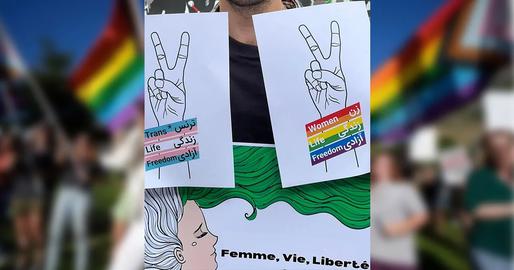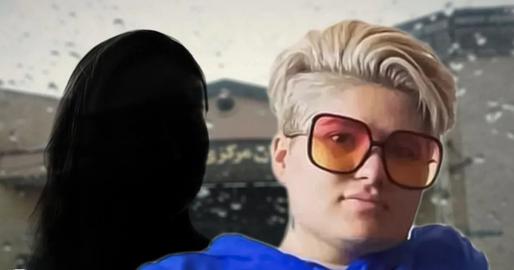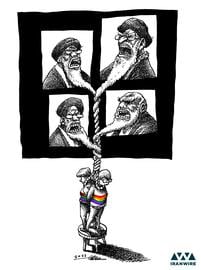Every Monday, Shaya Goldoust, a trans woman and activist, talks to a member of the LGBTQ+ community about their issues and problems on IranWire’s Instagram page. Her guest this week is Melika Zar, the public relations manager of Sheshrang [Six Colors] Network, with whom she talks about the participation of the LGBTQ+ community in the recent protests in Iran and its impact.
Soon after the news emerged that Mahsa Amini, a 22-year-old Iranian woman, had died following her arrest by the morality police, protests began in different cities of Iran.
Despite the repression and violence of the security forces, the presence of people in the streets has reached its fourteenth day. Many protestors have been killed by security forces and many others have been arrested and detained.
As protests spread nationwide, Iranians abroad showed their support and solidarity with their compatriots by holding large and small gatherings to try and convey their voice to the international community.
The protests of Iranians have been met with solidarity and respect in many countries, and this has led many social, political and artistic figures around the world to show their support for the Iranian people.
Among Iran’s protesters are countless members of the LGBTQ+ community who, like other sections of the society, demand the rights they have been denied during the four decades of the Islamic Republic.
Although the presence of the LGBTQ+ community inside Iran is not pronounced, it can be clearly seen in the protest gatherings of Iranians in different parts of the world. Many demonstrators have been seen holding rainbow flags and placards, chanting on behalf of their compatriots inside Iran and showing the people of Iran and the world that they are also a large part of the oppressed and marginalized Iranian society. They offer their solidarity, and demand to be seen.
My guest of this week’s program, Melika Zar, spoke to me about the presence of the LGBTQ+ community in Iranian demonstrations in different countries of the world and the impact of this presence.
"The presence of the LGBTQ+ community among Iranians abroad has been very clear. In 2019, when I personally went to protests outside Iran for the first time with a rainbow flag, we rarely felt the presence of this community, but now we see that the rainbow flag is more and more openly present in all protest gatherings."
Ms. Zar says the first reason for this change is that the LGBTQ+ community has recently experienced two tragedies which have caused the international community to pay more attention to the Iranian LGBTQ+ community. One was the killing of Alireza Fazli-Mofard, an Iranian gay man, by his family members, and the other was the death sentence issued by the Islamic Republic to Sareh and Elham, who are currently on death row. Other important events have also happened to this community, such as the self-immolation of Ella, an Iranian trans woman in Berlin, or a trans man who was murdered in Munich.
According to Melika Zar, the second point is that the LGBTQ+ community itself has become fully aware that the issue of their rights in Iran is still a political matter: "As long as the laws are against us and our lives are criminalized, they can use any excuse to oppress us legally. It is very positive that members of the LGBTQ+ community have become aware of their rights. Their presence with the LGBTQ+ flag and photos of Sareh and Elham are really notable at the recent protests and gatherings."
I asked Melika Zar about the situation of Sareh and Elham in prison, because unfortunately these days, due to the extensive coverage of the nationwide protests in Iran by the media and news agencies, no attention has been paid to the situation of these two members of the LGBTQ+ community and the heavy death sentence that was handed down.
"I agree that these days attention is focused on the protests, and unfortunately nothing else can be done, but wherever I was present, I personally held a picture of Sareh and Elham and emphasized that for these two people, time is passing quickly and their lives are in danger."
According to Melika Zar, Mahsa Amini and what happened to her are being talked about everywhere; it would have been good if they talked about Sareh and Elham alongside this issue, and if their hashtag had been shown alongside with the #MahsaAmini hashtag.
"I am very happy that the community outside of the LGBTQ+ community is striving to understand the concept of democracy, that is, if we want to live in a free Iran in the future of Iran, that Iran must be a safe country for all people."
"Democracy becomes meaningful when human differences are not a reason to suppress them,” Zar adds. “The presence of the LGBTQ+ community in the protests is very promising and it shows that we exist and we demand our rights, otherwise it will not be a free society."
visit the accountability section
In this section of Iran Wire, you can contact the officials and launch your campaign for various problems




























comments
How did this become a LGBTQ issue?